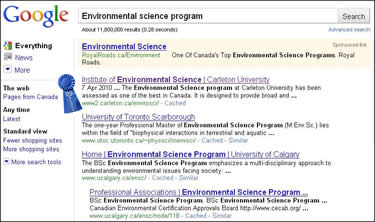We’re Number One! How to Improve Your Web Site’s Search Engine Ranking
We often receive the question from clients about how they can improve their web site ranking in the Search Engine Result Pages (SERPs). Or in other words, how can they make their web site number one (or as close as possible) in a list of search results of post-secondary institutions offering similar programs. Apart from keeping the keyword and SEO strategies in mind as discussed in parts 1 and 2 of this series, there is no magical answer in achieving number one status.

Overall, sites are ranked according to popularity. For instance, when you conduct a Google search do you ever wonder why when you start entering text in the search field that Google can sometimes read your mind by pre-populating the search field with keywords as you are typing? This scary, Big Brother-like phenomenon is part of the next generation of web applications known as Web 3.0 (which is a story for another time) and is the result of the accumulation and ranking of the most popular keywords entered on a similar topic. For example, users entering a search for “Environmental science programs” will get a search return where the Carleton Environmental Science site is ranked number one. How did they do that?
There are a broad range of factors that determine your search engine ranking such as home page links and specific search keyword combinations. In the case of the Institute of Environmental Science, their site is listed under the Popular Links section on the Carleton.ca homepage which is an obvious advantage to their ranking. In another example, when conducting a Google search for Carleton’s newest program Political Management, the Political Management home page is ranked eighth after entering the search terms “political management programs” but is ranked first after entering “political management programs in Ontario”. If your site is listed on the first Google search page, you are doing extremely well to drive visitor traffic to your site as how often do you scroll to the next page when conducting general Internet searches.
To improve your site’s ranking the best answer is that you must place time and effort into maintaining your web site. Update your content regularly, monitor your web analytics, and make changes based on the report findings. Here are some other things you can do to improve your search engine ranking:
- Use the All in One SEO pack. It is known that sites without a SEO application installed wouldn’t make Google’s top 100 list so SEO is the ultimate necessity.
- Create dynamic pages and content. If your static page content does not change often, consider adding a blog to your site or news and events postings. Search engines target updated and current text so blog and post regularly to feed those little web crawlers.
- Make your site speedy. Page load times determine your search ranking and sites that are 10MBs or more tend to get bumped down in search engine rankings. This may mean reconsidering your fancy Flash home page if it is slowing down your site.
- Optimize your links. For links directing traffic to your site, ensure you use a keyword for the link as opposed to simply “Click here”. The best links to generate traffic to your site are those created in blogs or in social networking sites because search engines consider these more relevant because they look more natural (a person links to your article in their post because they like it).
- Optimize your images. If you are adding images to your web site, use them sparingly as search bots and crawlers are grabbing text and text links on your page and too many images on a page mean less text trails to follow. In addition, name your image (or any media files) with meaningful, searchable terms. For example, an image of the Pacific Ocean should be named “Pacific_Ocean.jpg” versus “DSC900456.jpg”.
- Don’t become blacklisted. Search engines have the authority to “penalize” your site by not including it in search results if it violates specific web development guidelines. The good news for all CCMS clients is that your site is built to comply with all quality standards. So unless you engage in violations such as keyword spamming or article spinning (duplicating articles on your site that have a good search engine ranking), your site will never be blacklisted.
Search engines such as Google use complex ranking algorithms that are constantly changing which cause URLs to change positions in search results. So being obsessed with your web site ranking by trying to keep your site in-line with these unknown algorithms is an impossible feat and will drive you insane. The best thing you can do for your web site is to treat it as you would your plant; nurture it and give it the love and respect that it deserves.